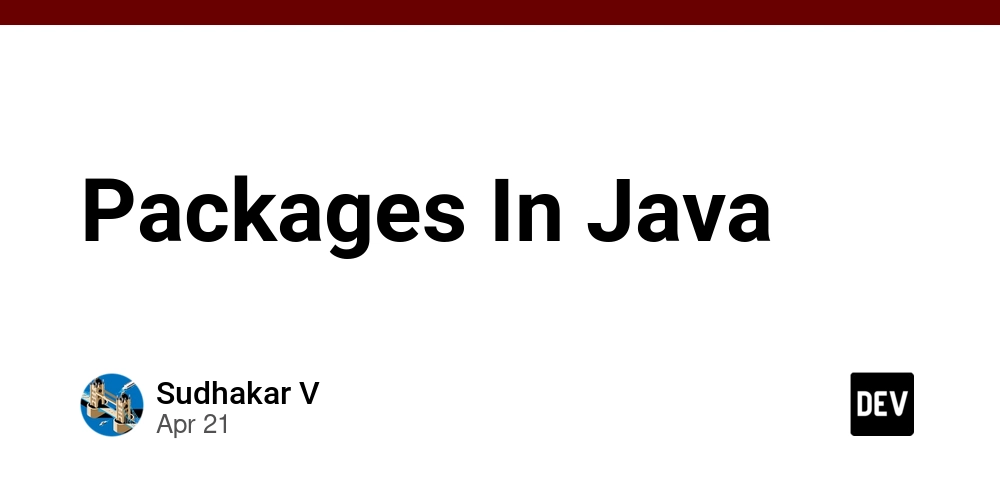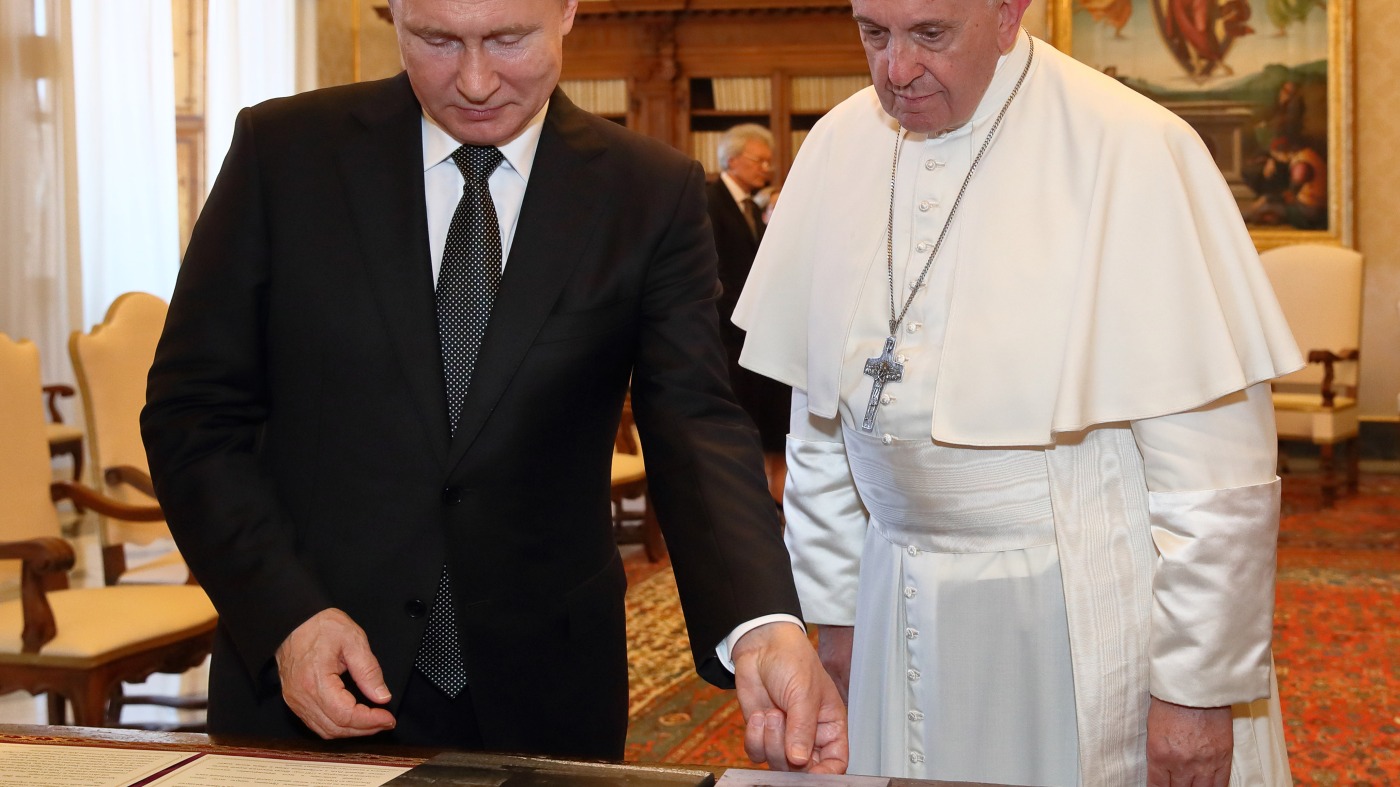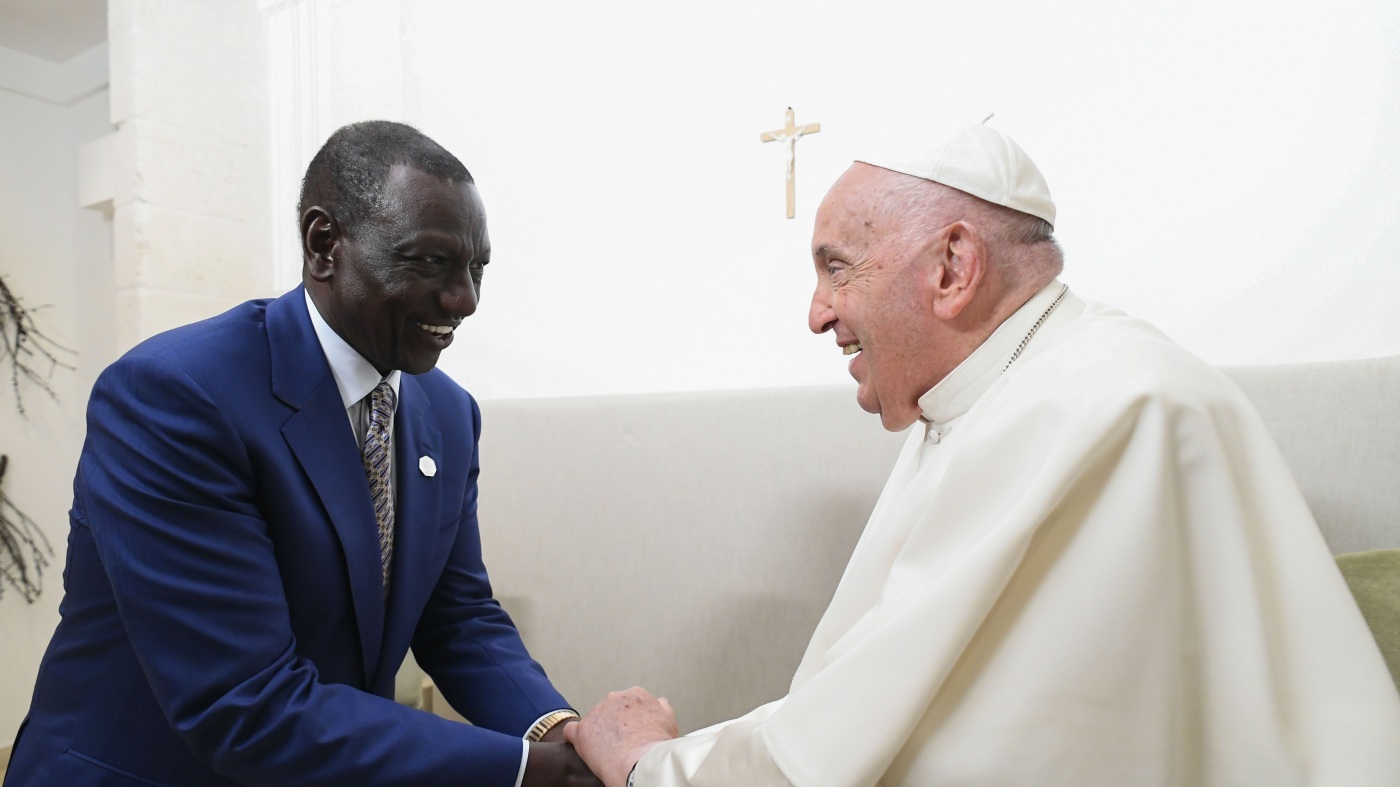Morning Report — Trade war or trade deals?
In today’s issue: President Trump signaled openness to governments clamoring to escape steep U.S. tariffs, even as he and advisers believe achieving accords with dozens of nations could involve months of tough discussions. “We’re going to get fair deals and good deals with everybody. And if we don’t, we’re going to have nothing to do...

Editor’s note: The Hill’s Morning Report is our daily newsletter that dives deep into Washington’s agenda. To subscribe, click here or fill out the box below.
In today’s issue:
- US begins global bartering over tariffs
- Budget vote a cliffhanger for Speaker
- Supreme Court greenlights deportations
- Trump surprise: US negotiating with Iran
President Trump signaled openness to governments clamoring to escape steep U.S. tariffs, even as he and advisers believe achieving accords with dozens of nations could involve months of tough discussions.
“We’re going to get fair deals and good deals with everybody. And if we don’t, we’re going to have nothing to do with them,” the president said Monday. “They’re not going to be allowed to participate in the United States.”
Trump rejected a 90-day pause in tariffs set to take effect on Wednesday, a bit of rumor that briefly relieved agitated financial markets before it was promptly dismissed by the White House as fiction. The president was in no mood to budge as he warned China that it faces another 50 percent in U.S. tariffs if it carries out promised retaliatory levies.
“If China does not withdraw its 34% increase above their already long term trading abuses by tomorrow, April 8th, 2025, the United States will impose ADDITIONAL Tariffs on China of 50%, effective April 9th,” the president posted on Truth Social. “Additionally, all talks with China concerning their requested meetings with us will be terminated!”
The New York Times analysis: China’s Ministry of Commerce on Tuesday accused the United States of “blackmail” and said Beijing would “fight to the end.” A devastating trade war between the two largest economies may be inevitable. It’s a showdown with painful consequences that will be felt across the world.
Glimmers of Trump’s receptiveness to future negotiations with trading partners triggered relief in major capitals. And battered world markets bounced back early Tuesday.
But U.S. investors, bankers, Trump-supporting corporate leaders and analysts question the tariff regime. Some CEOs believe the U.S. may already be in recession and warn that the administration’s economic strategy is inflationary, will chill consumer confidence and block the Federal Reserve’s runway for future rate cuts.
The Wall Street Journal and The Washington Post: Business titans broke their silence to criticize Trump’s trade policies. Billionaire Elon Musk made weekend appeals to the president to reconsider.
The president shrugged off the precipitous meltdown in financial markets and risks of the economic slowdown, describing a period of short-term pain to be followed by what he describes as a future U.S. economic boom and fairer trade.
Trump sidestepped a reporter’s question Monday after meeting at the White House with Israeli Prime Minister Benjamin Netanyahu about whether the U.S. would grant Israel relief from a new 17 percent reciprocal tariff. The prime minister came away empty-handed.
Treasury Secretary Scott Bessent said the president instructed him to negotiate with Japan after Trump spoke Monday with Prime Minister Shigeru Ishiba. “President Trump is going to be directly involved in those negotiations,” the secretary told Fox Business.
The process of fielding entreaties from “50, 60, maybe almost 70 countries” will take time, Bessent added, because discussions will involve tariff barriers, non-tariff trade barriers, assertions by the U.S. of currency manipulation, and whether countries have wage or industrial subsidies. “So, it's going to be a busy April, May, maybe into June,” he continued.
▪ The New York Times: Global leaders rush to woo Trump, hoping to sway him on tariffs.
▪ The New York Times: European Union officials said Monday they will vote on a list of potential retaliatory tariffs this week. European Commission President Ursula von der Leyen said the EU is willing to take a “zero-for-zero” approach to products including cars, which would jettison tariffs if the United States did the same. Trump’s response: “Not enough.”
The U.S. initially suggested there would be no exemptions to Trump’s tariffs, but the government published a list of carve-outs last week.
▪ The Hill’s Niall Stanage in The Memo: Trump under pressure on tariffs as Dow sinks again.
On Capitol Hill, farm-state Republicans in Congress are rattled about what they say is the lack of a clear off-ramp for Trump’s trade war. They fear losing lucrative markets for wheat, corn, soybeans, pork and other domestic products. They’re also nervously eyeing Trump’s sagging job approval when it comes to handling the economy.
SMART TAKE with NewsNation’s BLAKE BURMAN:
President Trump reiterated on Monday that if China doesn’t withdraw the 34 percent retaliatory tariff it placed on the U.S., the U.S. would respond by raising tariffs another 50 percent.
So, who will blink first? Gordon Chang, author of “Plan Red: China’s Project to Destroy America,” told me he doesn’t think Chinese President Xi Jinping will back down and that the history of the last negotiation could play a role going forward.
“I’m sure President Trump remembers that the Chinese violated the phase one trade deal of January 2020, so I’m not sure he’s going to be fooled again.”
It’s important to remember that this is likely just the beginning of a long road. During Trump’s first term, the negotiations between China and the U.S. spanned most of 2018 and 2019, and they had frequent twists and turns.
Burman hosts “The Hill” weeknights, 6p/5c on NewsNation.
3 THINGS TO KNOW TODAY:
▪ The White House is denying reports that it plans to hold a military parade in Washington for Trump’s 79th birthday in June — though local officials have been in contact with the administration about a celebration.
▪ The Environmental Protection Agency will reconsider the health impacts of fluoride in drinking water — taking what could be an initial step toward new national limits or a ban on the substance. Utah last month became the first state to ban fluoride in drinking water.
▪ Congressional Democrats on Monday held a rare bicameral forum to examine the Trump administration’s actions targeting Justice Department staff and major law firms.
LEADING THE DAY
© The Associated Press | J. Scott Applewhite
BUDGET BATTLES: Speaker Mike Johnson (R-La.) could face his heaviest legislative lift yet tomorrow as House fiscal hawks continue their staunch opposition to the Senate’s budget blueprint aimed at teeing up Trump’s ambitious legislative agenda. At least 10 House Republicans have said they will vote “no” on the measure, and a handful of others have publicly criticized the resolution, creating an uphill battle for Johnson as he looks to muscle it through his razor-thin majority. The Speaker is actively urging his ranks to fall in line, and the White House has begun making calls to House Republicans, The Hill’s Emily Brooks and Mychael Schnell report.
But a mounting swell of resistance among fiscal hawks is putting that plan in jeopardy. Rep. Andy Harris (R-Md.), the chair of the hard-line House Freedom Caucus who has sharply criticized the budget resolution, is advocating for the chamber to skip the vote altogether and move straight to crafting the details of the package — an unconventional move that would be a break from protocol.
Asked about prospects of the bill passing, Harris said Monday: “It doesn’t need to. The committees can do their work without the budget resolution.”
▪ Politico: Senate Majority Leader John Thune (R-S.D.) indicated Monday that a bipartisan Senate bill to check Trump’s unilateral tariff powers is likely going nowhere.
▪ The Hill: These seven GOP senators signed onto the tariff bill.
▪ The Hill: The Senate voted largely along party lines Monday to advance Elbridge Colby, Trump’s controversial pick to serve as the Defense Department under secretary for policy, overcoming the private concerns of several Republican senators about Colby’s past statements.
PROXY VOTING: The Democratic sponsors of legislation empowering new parents to vote remotely are rejecting a recent alternative from Johnson. Over the weekend, Johnson cut a deal with GOP Rep. Anna Paulina Luna (Fla.), who was leading the charge to force floor action on the issue. Their compromise would create a system of “vote pairing,” designed to empower pregnant lawmakers and young mothers with some remote voice during the consideration of bills on the floor, though not a direct vote.
The compromise appeased Luna, but not the Democratic sponsors of the underlying legislation — Reps. Brittany Pettersen (Colo.) and Sara Jacobs (Calif.) — who are accusing Johnson of watering down their parental-empowerment proposal while abandoning lawmakers with young families.
“Instead of letting us vote, he has instead gone to historic lengths to kill our resolution and make sure the large majority of his Members don’t have a voice,” Pettersen said in a Monday statement. “Let’s be clear: these changes are not a win for us and Speaker Johnson has turned his back on moms and dads in Congress and working families.”
The Hill: The Trump administration has taken its fight with Ivy League institutions to new heights by pulling hundreds of millions in funding, giving even some conservatives pause at its actions.
WHERE AND WHEN
- The House will meet at 10 a.m.
- The Senate will convene at 10 a.m.
- The president will participate at 10:30 a.m. in the planting of a sapling to take the place of the White House Andrew Jackson magnolia tree removed Monday because of age and safety. Trump will sign an executive order dealing with energy in the East Room at 3 p.m. He will deliver remarks at the National Republican Congressional Committee dinner at 6:45 p.m. at the Building Museum in Washington before returning to the White House at 8 p.m.
- Secretary of State Marco Rubio will meet in Washington with Moroccan Foreign Minister Nasser Bourita at 2 p.m. He will host a reception at the State Department at 4 p.m.
- The White House daily press briefing is scheduled at 1 p.m.
ZOOM IN
© The Associated Press | Mariam Zuhaib
ALIEN ENEMIES ACT: The Supreme Court on Monday vacated a judge’s order that temporarily barred the Trump administration from using the Alien Enemies Act (AEA) to deport Venezuelans, enabling the administration to resume removals under the wartime powers. The matter before the Supreme Court was not whether the Trump administration properly used its wartime power to expel those it accused of being gang members, but from where those challenging their removal must launch their suits.
The court said Venezuelans they seek to deport must have adequate notice in order to be able to challenge their removal — confronting the administration’s removal of men without giving them the ability to contest their alleged gang ties.
MISTAKEN DEPORTATION: Supreme Court Chief Justice John Roberts on Monday paused a judge’s midnight deadline for the Trump administration to return to the country a Maryland man mistakenly deported to El Salvador. The Trump administration has acknowledged an “administrative error” that mistakenly removed Kilmar Abrego Garcia, a Salvadoran national, despite an immigration judge’s 2019 ruling protecting him from being deported to El Salvador over fears of violence.
The Justice Department is insisting it cannot bring Abrego Garcia back to the U.S. now that he is in the hands of Salvadoran authorities, writing in court filings that the lower ruling “sets the United States up for failure.” In court filings, Abrego Garcia’s lawyers said the administration’s request is “built on a series of strawmen.”
“He sits in a foreign prison solely at the behest of the United States, as the product of a Kafka-esque mistake,” his attorneys wrote to the Supreme Court.
▪ The New York Times: Justice Department lawyers are struggling to defend Trump’s policies in court. Inside the department’s civil division, litigators are squeezed between judges demanding answers and bosses’ instructions to protect the Trump agenda at all costs.
▪ The Washington Post: The Justice Department’s recently fired pardon attorney accused agency leadership of “ongoing corruption” at a Monday congressional hearing meant to showcase concerns that the Trump administration is assaulting the rule of law, abusing its power and forcing out career civil servants.
DOGE: A federal appeals panel on Monday paused an order restricting the Department of Government Efficiency’s (DOGE) access to troves of sensitive personal data from three federal agencies. In a 2-1 decision, a panel of judges on the U.S. Court of Appeals for the 4th Circuit stayed an order barring the Office of Personnel Management (OPM) and the Treasury Department from disclosing the personal identifying information of roughly 2 million Americans to DOGE while the Trump administration appeals.
ELSEWHERE
© The Associated Press | WH Pool
ISRAEL AND GAZA: Trump and Netanyahu met Monday at the White House, where they discussed Israel’s renewed military operation in Gaza, danger to the lives of hostages held by Hamas, stalled ceasefire talks, and Iran’s persistent nuclear threat. Trump said the U.S. is working to get hostages released by Hamas and put in place a new ceasefire. Israel restarted military operations in Gaza last month amid the breakdown of a ceasefire with Hamas that was in place since Jan. 19.
“We’re looking at another ceasefire,” he said. “We’ll see what happens. But we have, we want to get the hostages out.”
The Hill’s Laura Kelly breaks down key topics from the last-minute meeting.
▪ CNN: Since Israel cut off humanitarian aid from the Gaza Strip a month ago, aid agencies report the plight of Gaza’s 2 million civilians has been worsened by intensive military operations. The United Nations and several aid organizations said hunger is spreading and there is less access to clean water.
▪ Reuters: Israeli troops flattened farmland and cleared entire districts in Gaza to open a "kill zone" around the enclave in December 2024, according to a new report, and that zone has since been expanded.
IRAN: Trump made a surprise announcement on Monday that the U.S. and Iran are poised to begin direct talks on Tehran's nuclear program, which would be the first since 2015. But a senior Iranian official said any negotiations would be indirect, with Oman acting as intermediary. The White House announced it will be sending Middle East envoy Steve Witkoff to lead the U.S. delegation in Oman. During his meeting with Netanyahu at the White House, the president issued a stark warning that if the talks are unsuccessful, “Iran is going to be in great danger.”
UKRAINE: Ukrainian officials are heading to Washington this week to find common ground on a much-anticipated minerals deal. Meanwhile, Russian President Vladimir Putin has indicated that Moscow is willing to go back to the negotiating table, but that several key questions about a potential ceasefire remain unanswered.
Trump, who has made promises to end the three-year war, has warned of the risks of it escalating into a world war between the United States and Russia.
New York magazine: Why Ukraine still isn’t about to lose.
OPINION
■ Trump is trashing America’s reputation, by Gerard Baker, columnist, The Wall Street Journal.
■ Abundance vs. equity in MAGA’s high-stakes tariff game, by Chris Stirewalt, political editor, The Hill.
THE CLOSER
© The Associated Press | Eric Gay
And finally …




































/https://tf-cmsv2-smithsonianmag-media.s3.amazonaws.com/filer_public/5d/76/5d76dc0a-1d19-402e-9d40-f2dc84932838/smithmag-deepsealifenorway-v2_web.jpg?#)





































